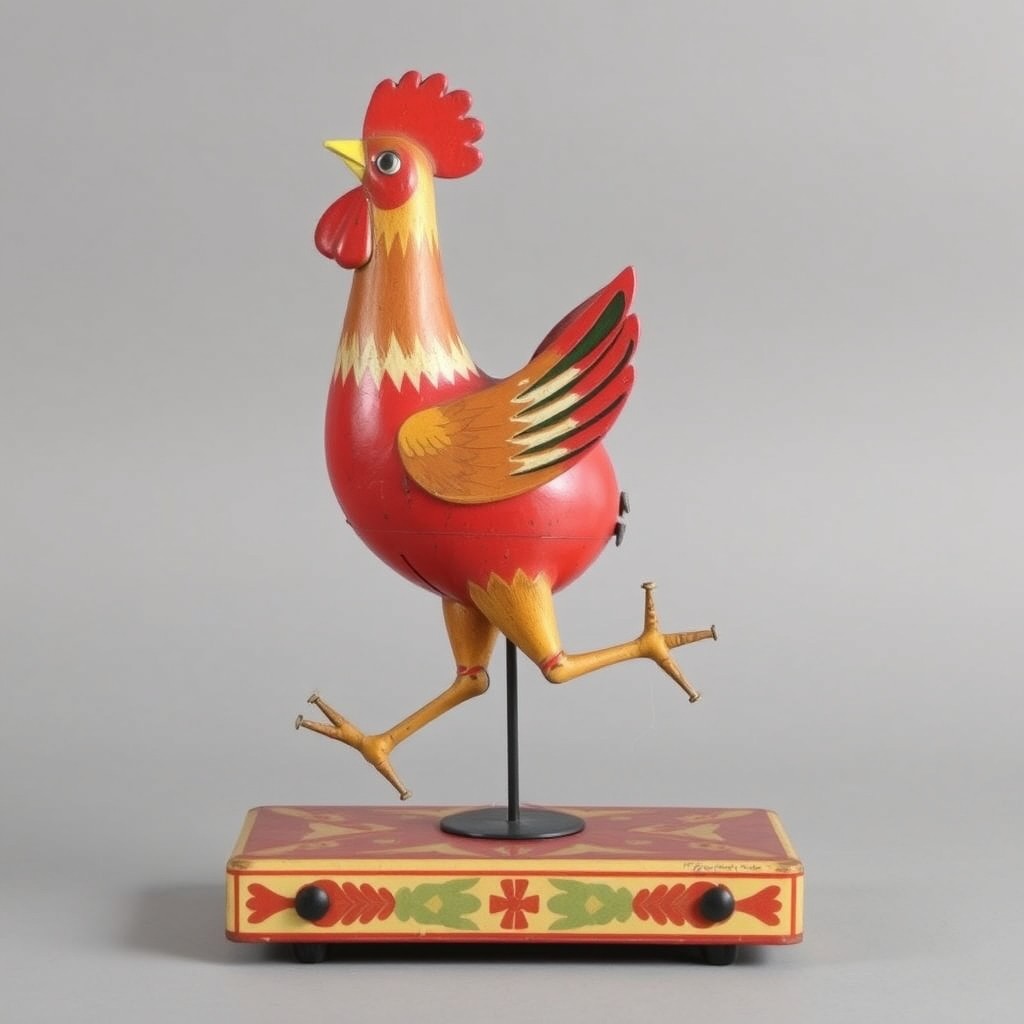Dancing Red Rooster — Vintage Cam-Driven Wind-Up
Our expert, hands-on review of a mid-century mechanical classic: motion, build, preservation, and collector value.
Product Overview

Quick Specifications
- Type: Cam-driven wind-up mechanical toy
- Shell: Stamped tin with enamel & feather decals
- Height: ~12–15 cm (variant dependent)
- Motion: Side-step “dance” with head bob
- Era: Mid-20th century
- Condition: Collector-grade vintage recommended
Hands-On Review & Analysis
Mechanical Performance
The mainspring delivers smooth torque to a weighted cam, shifting the center of gravity for a rhythmic side-step. Well-kept examples run 2–3 minutes per wind with a pleasant, soft tick—no scraping or wobble when the base is true.
Build & Finish
Stamped tin panels fit cleanly; enamel layers keep color depth; decals align to feather contours. Interior gearing shows consistent meshing and temper. Minor patina is common and desirable when even.
Expert Rating
Historical Context & Significance
Golden Age Engineering
1920s–1950s workshops perfected cams, springs, and balance for lifelike motion. The rooster’s dance is a signature pattern—recognizable cadence and stance that many collectors use for quick attribution.
Craft as Education
Beyond entertainment, wind-ups taught energy storage, gearing, and timing. Today they serve museums and classrooms as tangible STEM artifacts.
Collector Insights
- Rarity: Healthy supply, but top condition is scarce.
- Market Range: ~€60–€220 based on completeness & state.
- Look For: Even enamel, true base, quiet cam action.
- Provenance: Box, leaflet, retailer stamp add value.
How It Compares
Dancing Red Rooster
- Cam-driven side-step with head bob
- Durable tin & layered enamel
- Predictable, repairable mechanism
- Strong display presence
- High educational value
Similar Wind-Up Animals
- Motion varies (hops, waddles, spins)
- Mixed materials: tin, flock, plush
- Reliability depends on maker
- Collector interest uneven
- Educational value case-by-case
The Rooster stands out for its clean cam signature and finish quality—mechanically expressive yet robust enough for careful demonstration.
Care & Maintenance
Best Practices
Wind gently every few months; avoid over-winding. Keep enamel clean and dry; never wet the mechanism. Store in a stable, cool, low-UV environment.
Common Issues
Spring fatigue (shorter run-time), cam scrape (misalignment), decal lift (humidity). Seek a specialist for mainspring service; minor decal edges can be stabilized conservatively.
Maintenance Checklist
- Wind lightly; let it run down fully
- Dust with a soft brush; avoid solvents
- Check base trueness and foot pads
- Shield from direct sunlight/heat
- Document condition & provenance
Expert Recommendations
For Collectors
Prioritize original enamel, quiet cam action, and complete accessories. A straight base and even stance are key to that iconic dance.
For Educators
Use the rooster to illustrate energy storage, cam profiles, and center-of-mass shifts. Perfect for tactile STEM modules.
Our Verdict
A quintessential mid-century wind-up: mechanically articulate, visually charming, and pedagogically rich. Recommended for first-time and advanced collectors alike.
Need Help with Authentication or Valuation?
Send photos or book an appointment at our Paris studio — we’ll assess motion signature, finish, and originality.
